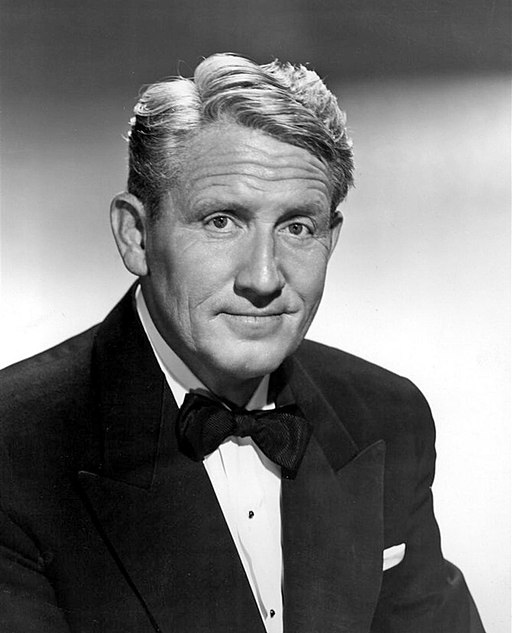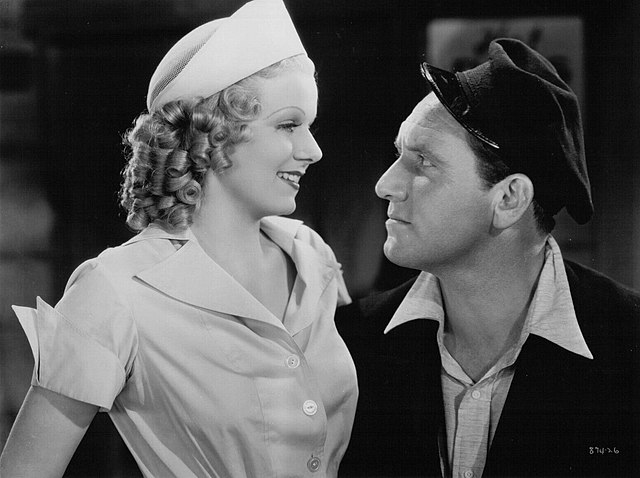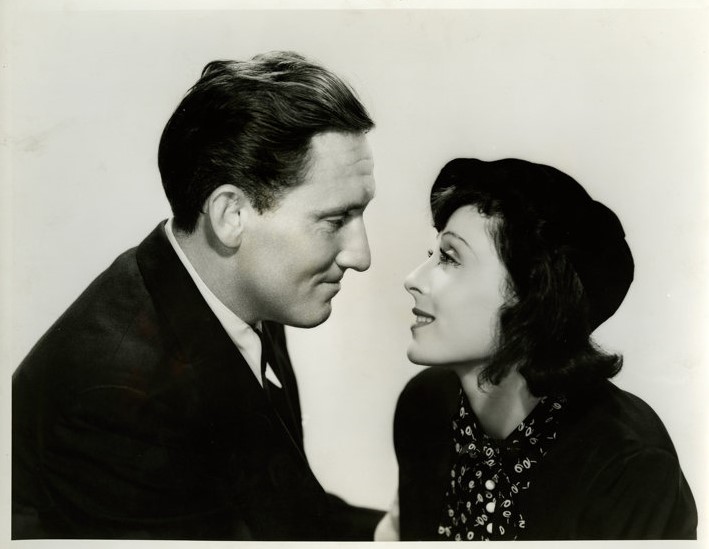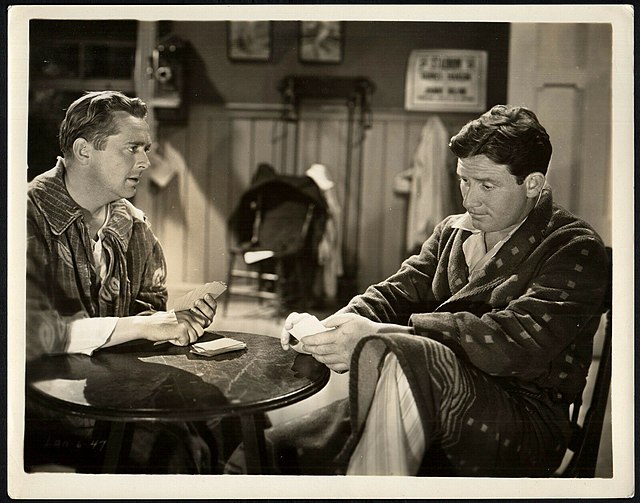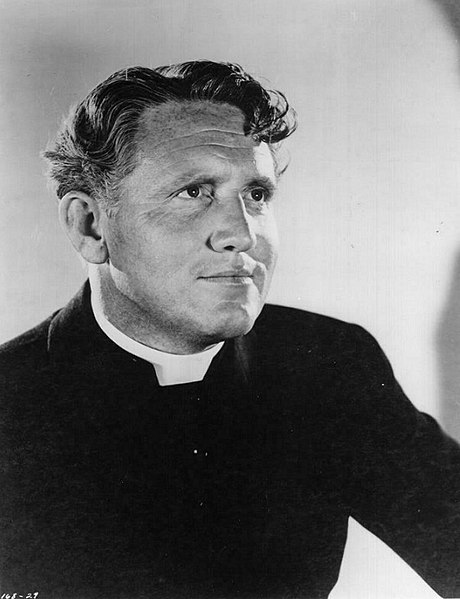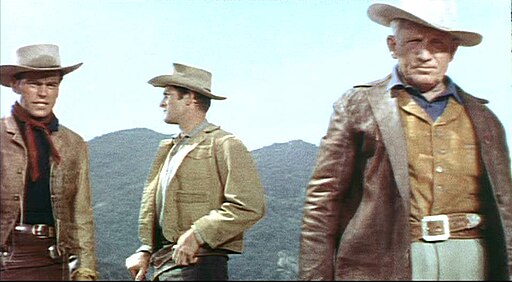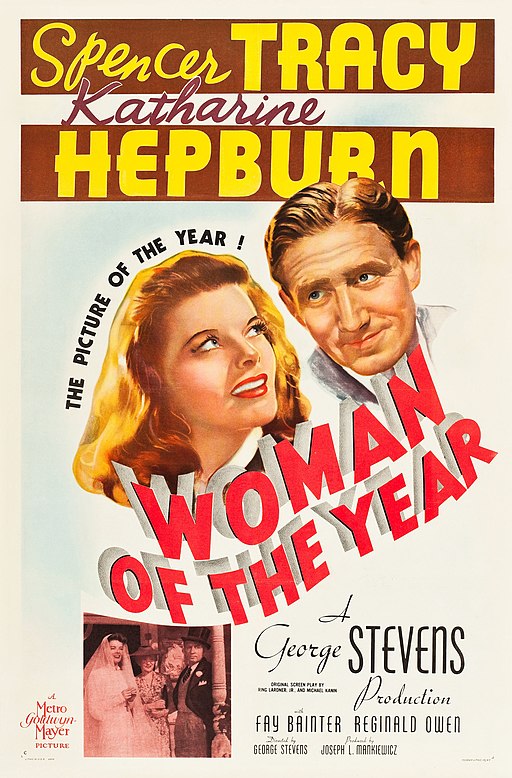Spencer Tracy
back| Full Name | Spencer Bonaventure Tracy |
| Stage Name | Spencer Tracy |
| Born | April 5, 1900 |
| Birthplace | Milwaukee, Wisconsin, USA |
| Died | June 10, 1967 |
| Buried | Forest Lawn Memorial Park, Glendale, California, USA |
| Married to | Louise Treadwell (1923–1967, until his death) |
| Children | John Ten Broeck Tracy and Louise |
| Notable films | Captain Courageous (1937) - Boys Town (1938) - Adam's Rib (1949) - Father of the Bride (1950) - Judgment at Nuremberg (1961) - Guess Who's Coming to Dinner (1967) |
Spencer Tracy
The Natural One
Spencer Tracy (1900-1967) was an acclaimed American actor known for his naturalistic acting style and versatility.
Tracy's career took off in the 1930s with significant roles in "Fury" and "San Francisco." He was renowned for his partnership with Katharine Hepburn, both on and off-screen. His performances were celebrated for their depth, authenticity, and emotional resonance.
Related
Spencer Tracy (1900 – 1967)
Biography, Movies, Quotes and Career Overview
Spencer Bonaventure Tracy was born on April 5, 1900, in Milwaukee, Wisconsin, to John Edward Tracy, an Irish-American truck salesman, and Caroline Brown, a Protestant convert to Roman Catholicism. He had one brother, Carroll, who was four years older. Tracy was raised Catholic and attended several Jesuit academies, including Marquette Academy in Milwaukee.
Tracy attended Ripon College, where he discovered his passion for acting. He went on to enroll in the American Academy of Dramatic Arts in New York City, graduating in 1923. Tracy made his Broadway debut in 1923 in a play titled "A Royal Fandango."
Tracy's stage career led to a contract with Fox Film Corporation in 1930. His first major film role was in "Up the River" (1930), directed by John Ford. Tracy's star began to rise after he moved to Metro-Goldwyn-Mayer (MGM) in 1935, where he would become one of the studio's top actors.
Major Film Roles: Throughout his career, Spencer Tracy became known for his naturalistic acting style and versatility. Some of his most important films include:
- "Captains Courageous" (1937): Tracy won his first Academy Award for Best Actor for his role as the Portuguese fisherman Manuel.
- "Boys Town" (1938): He won his second consecutive Best Actor Oscar for his portrayal of Father Edward J. Flanagan.
- "Adam's Rib" (1949): Tracy starred opposite Katharine Hepburn in this classic romantic comedy.
- "Father of the Bride" (1950): His role as the harried father earned him another Academy Award nomination.
- "Inherit the Wind" (1960): Tracy's portrayal of lawyer Henry Drummond, based on Clarence Darrow, was critically acclaimed.
- "Judgment at Nuremberg" (1961): Tracy's performance as Chief Judge Dan Haywood earned him an Oscar nomination.
- "Guess Who's Coming to Dinner" (1967): His final film, released posthumously, dealt with interracial marriage and earned him yet another Academy Award nomination.
Personal Life: Tracy married actress Louise Treadwell in 1923, and they had two children, John and Louise. Their son, John, was born deaf, which profoundly affected Tracy and influenced his later humanitarian work. Tracy had a long-term relationship with Katharine Hepburn, his frequent co-star, which lasted until his death. Despite their relationship, Tracy never divorced his wife Louise.
Death: Spencer Tracy passed away on June 10, 1967, from a heart attack. His final film, "Guess Who's Coming to Dinner," was released six months after his death. Tracy is interred at Forest Lawn Memorial Park in Glendale, California.
Legacy: Spencer Tracy is remembered as one of the greatest actors in the history of American cinema. He was nominated for nine Academy Awards and won two. Tracy's contributions to the film industry and his compelling performances continue to be celebrated.
Final Scene "Guess Who's Coming to Diner":
Authentic Style of Acting:
Spencer Tracy's acting style is often celebrated for its naturalism, subtlety, and authenticity, setting a high standard in Hollywood's Golden Age. His approach to acting was grounded in realism, allowing audiences to see him not merely as a character but as a real person with genuine emotions and motivations.
Naturalism and Subtlety
Tracy's performances were marked by a naturalistic approach, avoiding theatricality or overt dramatics. He had a remarkable ability to make his acting seem effortless, creating an impression that he was simply being rather than performing. His subtle expressions and understated delivery allowed him to convey complex emotions without exaggeration.
Deep Emotional Resonance
Tracy's strength lay in his ability to portray deep emotional truths. Whether playing a tough convict, a loving father, or a principled lawyer, he imbued his roles with a profound sense of humanity. His performances were often introspective, revealing inner conflicts and vulnerabilities that resonated with audiences.
Versatility and Range
Throughout his career, Tracy demonstrated remarkable versatility, seamlessly transitioning between genres such as drama, comedy, and romance. His ability to adapt to various roles showcased his wide range, from the rugged Manuel in "Captains Courageous" to the dignified Judge Haywood in "Judgment at Nuremberg."
Authenticity and Relatability
Tracy had a unique gift for making his characters relatable and authentic. He often played ordinary men facing extraordinary circumstances, allowing viewers to see themselves in his characters. This relatability made his performances particularly compelling and enduring.
Mastery of Dialogue
Tracy's skill with dialogue was another hallmark of his acting style. He had a keen sense of timing and a natural delivery that brought scripts to life. His performances were often characterized by clear, concise speech, and he was known for his ability to deliver lines with a conversational ease that felt genuine.
Chemistry with Co-Stars
One of Tracy's most notable on-screen partnerships was with Katharine Hepburn. Their chemistry was electric, and their performances together exemplified his ability to create believable and dynamic relationships with his co-stars. This rapport added depth to his characters and enhanced the overall narrative.
Commitment to the Craft
Tracy was known for his meticulous preparation and dedication to his roles. He thoroughly researched his characters and often drew from personal experiences to enhance his portrayals. His commitment to authenticity sometimes led him to make significant sacrifices for his art, demonstrating his deep respect for the craft of acting.
Understated Physicality
While not known for grand gestures or physical flamboyance, Tracy used his physical presence effectively. His body language was always in service to the character, with subtle movements and postures that conveyed much about the character's state of mind and emotions.
Integrity and Moral Complexity
Many of Tracy's characters were men of integrity, often facing moral dilemmas. He portrayed these roles with a nuanced understanding of human complexity, bringing depth to characters who might otherwise seem straightforward. His performances often explored themes of justice, honor, and ethical responsibility.
Memorable Quotes:
Quotes from Films
"Captains Courageous" (1937)
- "Women are good for something, Manuel. Fishing isn’t it."
- "We’re all fisherman here; all brothers. You too, maybe."
"Boys Town" (1938)
- "There’s no such thing as a bad boy."
"Dr. Jekyll and Mr. Hyde" (1941)
- "It's very hard to believe that he could be so good and so bad."
"Woman of the Year" (1942)
- "I don't care much for being married. It’s too permanent."
"Adam's Rib" (1949)
- "Lawyers should never marry other lawyers. This is called in-breeding; from this comes idiot children... and other lawyers."
"Father of the Bride" (1950)
- "You fathers will understand. You have a little girl. An adorable little girl who looks up to you and adores you in a way you could never have imagined. Then one day she gets interested in boys. Then she falls in love with one, some jerk who becomes her whole world. And in the blink of an eye, you’ve lost her."
"Pat and Mike" (1952)
- "Not much meat on her, but what's there is choice."
"Bad Day at Black Rock" (1955)
- "You know, Mac, the world's so full of simple things to delight in – it really is."
"Inherit the Wind" (1960)
- "I do not think about the things that I do not think about."
- "An idea is a greater monument than a cathedral."
"Guess Who's Coming to Dinner" (1967)
- "The only thing that matters is what they feel, and how much they feel, for each other. And if it's half of what we felt - that's everything."
Quotes about Acting and Life
On Acting:
- "Acting is not an important job in the scheme of things. Plumbing is."
- "Know your lines and don’t bump into the furniture."
On His Career:
- "There were times my pants were so thin I could sit on a dime and tell if it was heads or tails."
On Katharine Hepburn:
- "I don't know what Katharine Hepburn's got, but whatever it is, I like it."
On Success:
- "I'm just an old man who cleaned up pretty well."
On Life:
- "I say my prayers, I put on my shoes, and I hope for the best."
On Humility:
- "There’s not much to say about me. I like the past. The present is all right. The future can go fly a kite."
What Others said about Spencer Tracy:
Spencer Tracy was widely admired by his peers and critics alike. Here are some notable quotes from others about him, reflecting their respect and admiration for his talent and character:
Co-Stars and Directors
Katharine Hepburn:
- "He did what all actors try to do. He made it look easy. He wasn’t an actor. He was a human being."
- "There is no one else. He’s it. There is no one else who is even in his class."
Frank Capra (Director):
- "If ever there was a natural, it was Spencer Tracy. He had everything."
Stanley Kramer (Director):
- "Tracy is the greatest actor I ever worked with."
Elia Kazan (Director):
- "Spencer Tracy was a human being who happened to be an actor."
Clark Gable:
- "He makes you believe what he's saying. He makes you believe he is the character he's playing. There's nobody in his class."
Fellow Actors
Humphrey Bogart:
- "Spencer Tracy is the best goddamned actor I've ever seen."
James Cagney:
- "Tracy's the best. The most natural, the most real."
Marlon Brando:
- "When I saw Spencer Tracy act, I thought, that’s real. I want to do that."
Ingrid Bergman:
- "Tracy was always there, a rock of stability. He seemed so natural that I never knew he was acting."
Laurence Olivier:
- "Spencer Tracy's acting defies analysis. It simply is. I have never seen a more natural actor than Tracy."
Critics and Writers
James Agee (Film Critic):
- "Spencer Tracy is as complete an actor as anyone could hope to be."
David Thomson (Film Historian):
- "Tracy’s gift was in making everything he did look natural, which was his achievement and the standard by which everyone else had to be judged."
Kenneth Tynan (Theater Critic):
- "Tracy is the greatest actor of the naturalistic style, and he stands as a model to all future generations."
Bosley Crowther (Film Critic for The New York Times):
- "Tracy was an actor’s actor, an unpretentious artist who was capable of conveying complex emotions with astonishing clarity."
Personal Tributes
George Cukor (Director):
- "I have a strange superstition about acting. I believe that no one should know what an actor does or how he does it – just that he does it. Spencer Tracy is an actor of this mysterious kind."
Angela Lansbury:
- "Spencer Tracy was the epitome of the best of American actors. He was always genuine, never phony, and his humanity shone through."
Richard Widmark:
- "Spencer Tracy was the most honest and straightforward actor I've ever met. He was so convincing that it was hard to see where he ended and his characters began."
Awards and Recognition:
Academy Awards (Oscars)
Wins:
Best Actor for "Captains Courageous" (1937)
Best Actor for "Boys Town" (1938)
Nominations:
Best Actor for "San Francisco" (1936)
Best Actor for "Father of the Bride" (1950)
Best Actor for "Bad Day at Black Rock" (1955)
Best Actor for "The Old Man and the Sea" (1958)
Best Actor for "Inherit the Wind" (1960)
Best Actor for "Judgment at Nuremberg" (1961)
Best Actor for "Guess Who's Coming to Dinner" (1967)
Golden Globe Awards
Wins:
Best Actor in a Motion Picture – Drama for "The Actress" (1953)
Nominations:
Best Actor in a Motion Picture – Drama for "The Old Man and the Sea" (1958)
BAFTA Awards
Nominations:
Best Foreign Actor for "The Old Man and the Sea" (1958)
Best Foreign Actor for "Inherit the Wind" (1960)
Best Foreign Actor for "Judgment at Nuremberg" (1961)
Cannes Film Festival
Wins:
Best Actor for "Bad Day at Black Rock" (1955)
Laurel Awards
Wins:
Top Male Dramatic Performance for "Judgment at Nuremberg" (1961)
Top Male Star (1962)
Other Honors
New York Film Critics Circle Awards:
Best Actor for "The Power and the Glory" (1933)
Best Actor for "Judgment at Nuremberg" (1961)
Venice Film Festival:
Best Actor for "Judgment at Nuremberg" (1961)
Lifetime Achievement and Special Awards
Kennedy Center Honors (1983, posthumously)
Recognized for his contribution to American culture through the performing arts.
AFI Life Achievement Award (1979)
Honored for his lifetime of achievements in the motion picture industry.
Additional Recognition
Hollywood Walk of Fame:
Tracy has a star on the Hollywood Walk of Fame at 6814 Hollywood Boulevard, honoring his contributions to the film industry.
Other Film and Critics' Awards:
Throughout his career, Tracy was often recognized by various critics' associations and film festivals, contributing to his reputation as one of the greatest actors of his time.
List of Movies featuring Spencer Tracy:
1930s
- Up the River (1930) - Tracy stars as a convict who escapes from prison to help a fellow inmate in love. It's notable for being an early film by director John Ford and also features Humphrey Bogart.
- The Power and the Glory (1933) - Tracy plays a self-made businessman whose rise and fall are chronicled in a series of flashbacks, highlighting the cost of success.
- Man's Castle (1933) - A romance between a homeless man and a young woman during the Great Depression, directed by Frank Borzage.
- 20,000 Years in Sing Sing (1932) - Tracy plays a convict determined to go straight after his release, but his plans are thwarted by a corrupt warden.
- Viva Villa! (1934) - A biographical film about the Mexican revolutionary Pancho Villa, in which Tracy plays a supporting role.
- The Murder Man (1935) - Tracy stars as a newspaper reporter covering a high-profile murder case, only to become involved in solving the crime himself.
- Fury (1936) - Directed by Fritz Lang, Tracy plays a man wrongfully accused of a crime who becomes the target of a lynch mob, exploring themes of justice and revenge.
- San Francisco (1936) - Tracy is a priest who tries to reform a wayward gambler and nightclub owner amidst the backdrop of the 1906 San Francisco earthquake.
- Captains Courageous (1937) - Tracy won his first Oscar for his role as Manuel, a Portuguese fisherman who mentors a spoiled rich boy stranded at sea.
- Big City (1937) - Tracy and Luise Rainer star in this drama about the struggles of immigrants in New York City.
- Test Pilot (1938) - Tracy stars alongside Clark Gable and Myrna Loy in this film about the life of a test pilot and the dangers of early aviation.
- Boys Town (1938) - Tracy's second Oscar-winning performance as Father Flanagan, who starts a home for troubled boys.
- Stanley and Livingstone (1939) - Tracy portrays the journalist Henry Morton Stanley in this adventure biopic about his quest to find the explorer Dr. David Livingstone.
1940s
- Northwest Passage (1940) - Tracy stars as a leader of an expedition searching for a fabled passage through North America.
- Dr. Jekyll and Mr. Hyde (1941) - Tracy plays the dual roles of the kind Dr. Jekyll and his evil alter ego, Mr. Hyde, in this adaptation of the classic Robert Louis Stevenson tale.
- Woman of the Year (1942) - Tracy and Katharine Hepburn's first film together, a romantic comedy about a mismatched couple working in journalism.
- Keeper of the Flame (1942) - Tracy plays a journalist uncovering the dark secrets of a recently deceased national hero.
- A Guy Named Joe (1943) - Tracy is a deceased pilot who becomes a guardian angel to a younger aviator, helping him through life and love.
- The Seventh Cross (1944) - Tracy stars as an escapee from a Nazi concentration camp trying to make his way to freedom.
- Thirty Seconds Over Tokyo (1944) - Tracy plays Lt. Col. James Doolittle in this dramatization of the famous Doolittle Raid during World War II.
- Without Love (1945) - Tracy and Hepburn star in this romantic comedy about a marriage of convenience that turns into real love.
- The Sea of Grass (1947) - Tracy and Hepburn team up again in this Western about a rancher and his wife struggling with land disputes and personal conflicts.
- Cass Timberlane (1947) - Tracy plays a small-town judge who marries a much younger woman, leading to challenges in their relationship.
- State of the Union (1948) - Tracy stars as a businessman persuaded to run for president, with Hepburn as his estranged wife.
- Edward, My Son (1949) - Tracy's portrayal of a businessman who will stop at nothing to secure his son's future, even as it leads to moral and legal consequences.
1950s
- Adam's Rib (1949) - Tracy and Hepburn as married lawyers who find themselves on opposite sides of a courtroom battle.
- Father of the Bride (1950) - Tracy stars as the bemused father dealing with the trials of planning his daughter's wedding.
- The People Against O'Hara (1951) - Tracy is a lawyer coming out of retirement to defend a young man accused of murder.
- Pat and Mike (1952) - Another Tracy-Hepburn collaboration, with Tracy as a sports promoter managing a talented female athlete.
- Plymouth Adventure (1952) - Tracy plays the captain of the Mayflower in this dramatization of the Pilgrims' voyage to America.
- The Actress (1953) - Tracy portrays the supportive father of a young girl aspiring to become an actress, based on Ruth Gordon's autobiography.
- Broken Lance (1954) - Tracy stars as the patriarch of a ranching family dealing with internal conflicts and external threats.
- Bad Day at Black Rock (1955) - Tracy's Oscar-nominated performance as a one-armed man uncovering a dark secret in a small town.
- The Mountain (1956) - Tracy plays an older brother who guides his sibling through dangerous mountain terrain to loot a plane crash site.
- Desk Set (1957) - Tracy and Hepburn reunite in this comedy about the clash between human resourcefulness and technology in a TV network's research department.
- The Old Man and the Sea (1958) - Tracy stars in the adaptation of Ernest Hemingway's novella about an aging fisherman's epic struggle with a giant marlin.
1960s
- Inherit the Wind (1960) - Tracy's portrayal of Henry Drummond, based on the real-life lawyer Clarence Darrow, in this dramatization of the Scopes "Monkey" Trial.
- Judgment at Nuremberg (1961) - Tracy stars as the chief judge in a trial of Nazi war criminals, earning another Oscar nomination for his performance.
- How the West Was Won (1962) - Tracy narrates this epic Western that traces the history of American westward expansion.
- It's a Mad, Mad, Mad, Mad World (1963) - A star-studded comedy with Tracy as a police captain coordinating the pursuit of a hidden fortune.
- Guess Who's Coming to Dinner (1967) - Tracy's final film, where he plays the father of a young woman who brings home her African-American fiancé, challenging his previously held prejudices.

